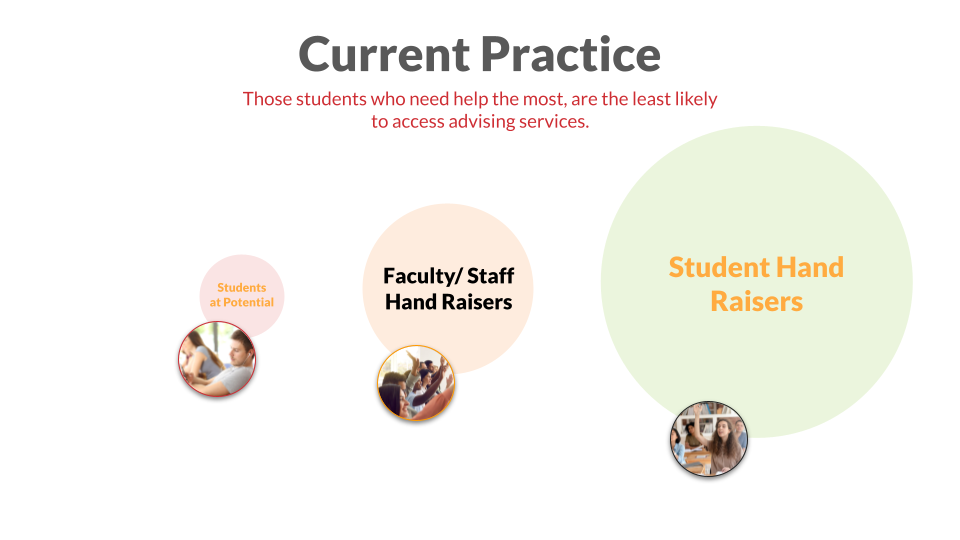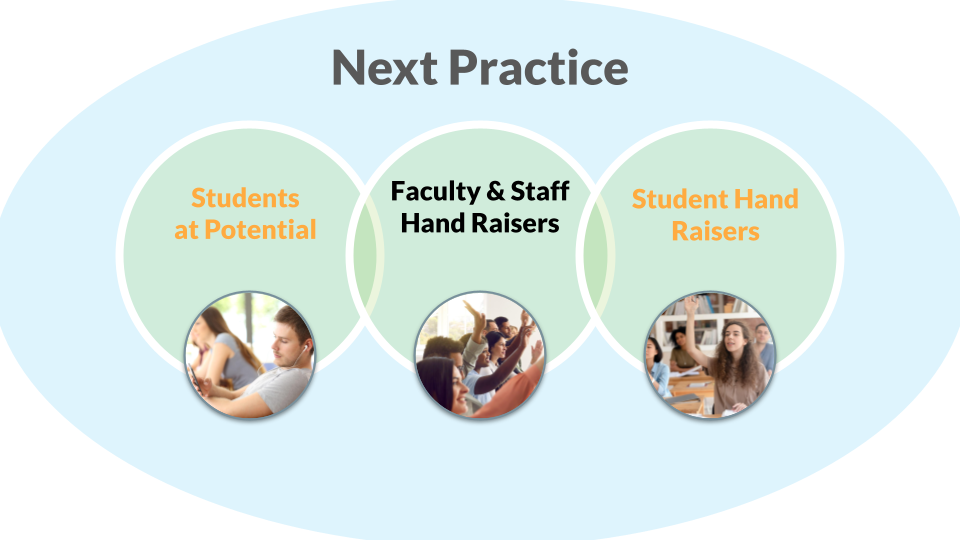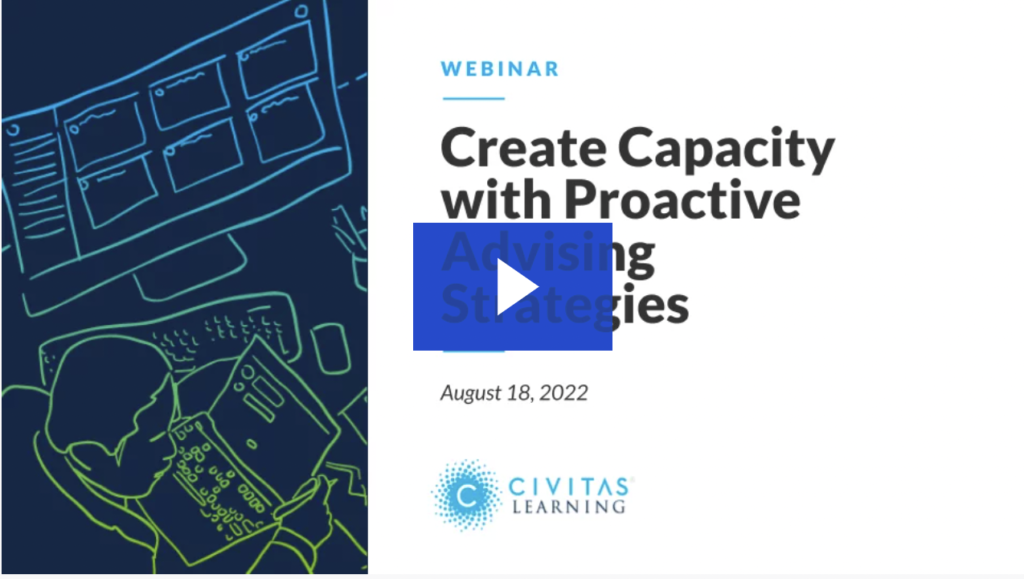
An Updated Approach to Academic Advising Caseload Management
Share this Post
I’ve lost track of how often I’ve heard the following phrase in college meetings, “The advising team can do it,” when talking about taking on new projects or duties. They certainly can, but the additional work comes at a cost. Ever-expanding roles, high caseloads, and advisor turnover are overwhelming many campuses.
Advisors by nature, at least all the ones I’ve met over the 20 years of doing this work, tend to be helpers and want to get things right for the benefit of their students and institutions. Despite their best intentions and hard work, traditional advising caseload management practices like mass communications and first come, first serve appointments aren’t as effective as they used to be.
We need a better way to serve students. We need an approach to academic advising caseload management that ensures advisors can help all students and frees them from crushing workloads.
Flipping the Script on Traditional Advising
A “what you do for one, you do for all” approach is unsustainable and burdensome for advisors. Instead, it’s time to shift from a one-size-fits-all approach to a data-activated framework that enables advisors to ease capacity constraints by tailoring support methods to the needs of specific student groups.
Through work with our partner institutions, we’ve learned that advisors spend a disproportionate amount of their time with students who are already likely to persist (i.e., students proactively utilizing support services) -leaving minimal bandwidth to reach more vulnerable students. Taking this unbalanced approach to managing caseloads is burning out advising teams and adding to the decline in student retention.
Civitas Learning’s most successful institutional partners are flipping the script on this traditional approach. Instead of treating every student the same, these institutions use actionable analytics, like persistence or completion predictions, to diversify how they deliver support. In this new approach, advisors can match their level of engagement with the level of student need – allowing them to become more efficient and effective.
Getting Students the Right Support
In our on-demand webinar, Create Capacity with Proactive Advising Strategies, Vice President of Product Rebecca Reid and I share how our institutional partners create capacity for proactive advising with an intentional advising framework and intelligent case management software.
In this “flipped” approach, advisors provide each student with the right support instead of the same support. This doesn’t mean abandoning those students who actively seek guidance. Instead, it’s about empowering advisors to take back control of their time by tailoring outreach and interactions to the needs of particular student groups.


We explore how moving away from a one-size-fits-all approach allows advisors to provide more manageable and impactful services by diversifying their interaction with three common student subgroups:
- Hand Raisers
Hand raisers are the most proactive students in your caseloads. They respond well to email nudges and are the first to fill up your advising appointment slots. They are the most likely to persist toward graduation with little need for intervention.
The University of Central Oklahoma diversifies support by sending timely and intentional email campaigns. In one example, the Criminal Justice department uncovered data that criminal justice majors earning an average grade of 74% or lower were less likely to persist to the following term.
In partnership with UCO’s Student Advocacy team, the department chair developed precise messaging to connect students who were less likely to persist to resources to help them succeed in their classes. Using precise email campaigns, the Criminal Justice department engaged 300 students with individualized support, resulting in positive student feedback and improved persistence and retention.
- Flagged By Early Alerts
Flagged students are on your radar because a faculty or staff member raised an alert within a student success system. Early alerts can create an unmanageable influx of students who may or may not need immediate help. Institutional processes often dictate that advisors prioritize these flagged students over others.
One tactic partner institutions use to better manage the volume of faculty-initiated early alerts is to train faculty on sending better alerts. In this scenario, faculty members can improve the quality of alerts by raising them when they see a significant shift in a student’s engagement with the class or observe concerning behavior. This shift from academically motivated alerts to behaviorally motivated alerts diminishes the volume of alerts advisors must manage and improves the quality of information faculty are sharing with advisors.
- At Potential
Students at potential are those who are least likely to seek help but most likely to need it. They’re the ones that don’t respond well to generic email outreach and text campaigns. This student drops in at the last minute when you only have 5 or 10 minutes to spend with them or never comes at all. Because traditional case management practices best serve students with strong advocacy skills, students at potential are often the group that is least likely to be seen by an advisor.
The knowledge that specific student groups benefit much more from personalized advising support enabled leaders at Snow College to make strategic adjustments like introducing group advising to create more capacity for personalized support for the students who need it most. Initiative analysis of their advising program revealed while all students benefit from personalized advising, lower-performing students saw a 20% boost in persistence due to an individual advising meeting compared to a 3% lift among high-performing students. With advising loads up to 500 students to 1, Snow advising teams now know who to prioritize for individualized advising appointments.
Create Capacity for Proactive Advising
By connecting students with the right support instead of the same support, advisors have the capacity to provide students with the support they need proactively. Access to real-time insights coupled with intelligent case management tools empowers advisors to organize their outreach efforts based on need rather than demand- easing capacity constraints and student success.
To further explore how your team can start flipping advising case management on its head, watch our Create Capacity with Proactive Advising Strategies webinar on demand, and share it with your team to spark conversation about how to start shifting your approach to better serve students and advisors.




